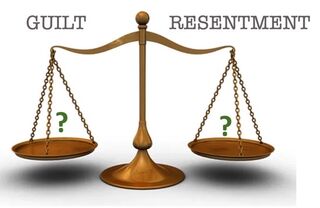Guilt
The Choice Between Guilt and Resentment
Managing the emotions that come with saying no or yes.
Posted October 12, 2021 Reviewed by Abigail Fagan
Key points
- Saying no to people can elicit many emotions, and taking care of ourselves can evoke guilt.
- Taking care of others at the expense of ourselves can lead to resentment, which can erode relationships.
- Providing an explanation and being gentle and caring can help you say no with kindness.
Martha and Harvey, Taylor’s parents, asked to stay at Taylor's apartment for the weekend. Taylor did not want their (they are non-binary and use the "they" pronoun) parents to stay with them. They desperately needed downtime to relax and be alone after a hard week at work. Their parents had the financial means to stay at a hotel.
Clara‘s boss asked her to work late on Tuesdays. Clara did not want to quit night school to accommodate the request.
Fred wanted his wife Sarah to wear high heels when they went out because he found them sexy. Sarah loved him and wanted to please him, but found them too uncomfortable to bear.
Bret’s neighbor asked him to walk his dog for a weekend when he had to be out of town. Bret was experiencing an episode of depression, which made commitments difficult.
Situations that require us to choose between what we want and what others want are part of life. Nevertheless, these conflicts put us in challenging positions that increase anxiety. We must decide if we should "suck it up" and do the right thing for someone else, or give ourselves permission to choose what feels right for us.

Is there anything that can help navigate this conflict?
Acknowledging and working with guilt and resentment helps bring some clarity to our conflicts.
If we decide in favor of ourselves, we must contend with guilt. And because guilt is so painful, it is tempting to avoid that feeling and agree to things we don't want or aren't able to do without taking a toll on our physical and emotional wellbeing.
But agreeing to do something we fundamentally don’t want to do breeds resentment.
Choosing between guilt and resentment is a tough choice.
“Pick your poison,” I tell my patients. “Whatever you choose, you’ll have to contend with some emotion. The choice between guilt and resentment is a tough one. But since we can't avoid experiencing one of them, let's at least think through what is best for you and your relationship in this particular situation.”
Of course, sometimes we can do things we don’t want to do without resentment. We are happy to help or we feel virtuous that we have the capacity to do things for the people we love.
Similarly, sometimes we can take care of ourselves without guilt rearing its torturous head. We believe we deserve to take care of ourselves and we trust that others we occasionally forsake will understand and still love us. We trust others can tolerate disappointments without retaliating or withdrawing from the relationship we have with them.
But for most of us the “guilt versus resentment choice” will rear its difficult head. When those times arise, here are some tips that might help.
Considering Guilt Versus Resentment
When it comes to relationships, resentment is a killer. If we agree to do a task or a favor begrudgingly, we are wise to consider how the resentment will affect our love and connection. Consider how resentment affects your body and your mind? How does it alter your connection to the person to whom you feel resentful?
Many people choose to rest on the side of resentment because they cannot tolerate how guilt makes them feel inside. They also cannot tolerate the other person feeling sad, angry, or disappointed.
Avoiding emotions is tempting. They are painful to bear. But if we don't face emotions head-on, and we choose resentment, we can destroy the connections we care about. So it benefits us greatly to practice being with emotions using practical tools like the Change Triangle.
It’s paradoxical that to have better relationships and feel better in the long run, we have to tolerate hard emotions in the short term.
I recommend imagining each scenario in order to evoke the actual feelings we will experience, like a “feelings dress rehearsal.” For example, Clara imagined saying yes to her boss’s request to work Tuesday evenings. Staying with the fantasy dress rehearsal, she imagined how she’d feel afterward. Her blood started to boil, and she noticed resentment wash over her in the form of negative feelings towards the boss she once admired and appreciated. This exercise gave her the courage and strength to consider another way.
How to Say No with Kindness and Love — Not Defensiveness
We can say no in kind and gentle ways that foster understanding.
For example, I suggested to Taylor to sandwich the bad news between two loving statements. Here’s what Taylor said to their parents, "I love you guys and I love spending time with you. But if I don't have time alone in my apartment during the weekend I can't refuel and function to get through my work week. Would you be ok with staying at a hotel? I don't want you to take it personally because I love and care about you guys very much. It is really about me and my need for solitude over the weekend so I can rejuvenate."
Clara asked a thought-out question to her boss using skills like changing the BUT to an AND. She said, "I really love this job and I don't want to jeopardize it. AND I am in night school and don't want to quit because getting a degree is important to me as well. Is there another night I could work late or better yet do you have someone else you can ask to work Tuesday evenings?"
Sarah decided to say, "I love you Fred and I want to please you. And, high heels hurt my feet so much I can't enjoy myself. Is there some other way I could please you that works for us both?" Fred said, “No problem! I don’t want you to be uncomfortable.”
Bret decided to keep it really real. He explained to his neighbor that he’s been suffering from depression and committing to care for a dog was just too much for him. He said how very sorry he was that he could not help.
Most of the time, people do understand when we frame things in kind and caring ways.
Feeling guilty for choosing ourselves is normal precisely because we are good people. We have a conscience and that conscience puts us into a conflict between what is best for ourselves versus what is best for others who we count on and love. It's sociopaths who don't feel guilty.
Working with Guilt
There’s no way around it. We must practice tolerating the feeling of guilt without taking action. I recommend getting to know how guilt feels inside. The more we can turn into the sensations that guilt creates in our body, the less afraid and avoidant we will grow.
Guilt feels physically painful. Notice where you feel guilty feelings in your body? Just notice and breathe. Remind yourself that you can tolerate emotions in yourself and others.
Guilt makes our mind tell us how selfish and terrible we are for choosing ourselves. What harsh words does guilt say to you?
Can you talk back to your guilt? Remind yourself that taking care of yourself isn’t a crime even if it goes against what someone else may wish. You are choosing yourself this time as part of self-care and to spare your relationship from corrosive resentment.
We must trust that the other person can tolerate and recover from their own feelings. Give them permission to have their emotions and reactions. Don’t get defensive. Simply reiterate that you appreciate their effort to understand. Then engage in an activity to take your mind off the whole situation, Remind yourself that the pain and discomfort are temporary. By tomorrow, you will feel better.
Remembering that resentment erodes love may help you make the changes you need. And if your guilt tells you you’re selfish, remind the guilty part of you that you are not selfish but self-caring, and that’s a good thing!




